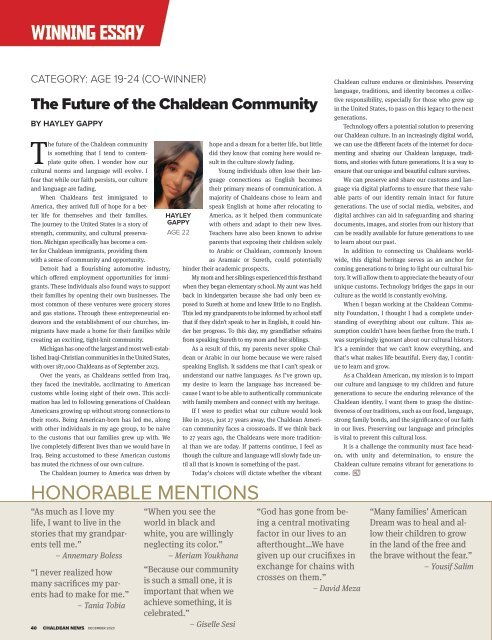Create successful ePaper yourself
Turn your PDF publications into a flip-book with our unique Google optimized e-Paper software.
WINNING ESSAY<br />
CATEGORY: AGE 19-24 (CO-WINNER)<br />
The Future of the Chaldean Community<br />
BY HAYLEY GAPPY<br />
The future of the Chaldean community<br />
is something that I tend to contemplate<br />
quite often. I wonder how our<br />
cultural norms and language will evolve. I<br />
fear that while our faith persists, our culture<br />
and language are fading.<br />
When Chaldeans first immigrated to<br />
America, they arrived full of hope for a better<br />
life for themselves and their families.<br />
The journey to the United States is a story of<br />
strength, community, and cultural preservation.<br />
Michigan specifically has become a center<br />
for Chaldean immigrants, providing them<br />
with a sense of community and opportunity.<br />
Detroit had a flourishing automotive industry,<br />
which offered employment opportunities for immigrants.<br />
These individuals also found ways to support<br />
their families by opening their own businesses. The<br />
most common of these ventures were grocery stores<br />
and gas stations. Through these entrepreneurial endeavors<br />
and the establishment of our churches, immigrants<br />
have made a home for their families while<br />
creating an exciting, tight-knit community.<br />
Michigan has one of the largest and most well-established<br />
Iraqi-Christian communities in the United States,<br />
with over 187,000 Chaldeans as of September <strong>2023</strong>.<br />
Over the years, as Chaldeans settled from Iraq,<br />
they faced the inevitable, acclimating to American<br />
customs while losing sight of their own. This acclimation<br />
has led to following generations of Chaldean<br />
Americans growing up without strong connections to<br />
their roots. Being American-born has led me, along<br />
with other individuals in my age group, to be naive<br />
to the customs that our families grew up with. We<br />
live completely different lives than we would have in<br />
Iraq. Being accustomed to these American customs<br />
has muted the richness of our own culture.<br />
The Chaldean journey to America was driven by<br />
40 CHALDEAN NEWS <strong>DECEMBER</strong> <strong>2023</strong><br />
HAYLEY<br />
GAPPY<br />
AGE 22<br />
hope and a dream for a better life, but little<br />
did they know that coming here would result<br />
in the culture slowly fading.<br />
Young individuals often lose their language<br />
connections as English becomes<br />
their primary means of communication. A<br />
majority of Chaldeans chose to learn and<br />
speak English at home after relocating to<br />
America, as it helped them communicate<br />
with others and adapt to their new lives.<br />
Teachers have also been known to advise<br />
parents that exposing their children solely<br />
to Arabic or Chaldean, commonly known<br />
as Aramaic or Sureth, could potentially<br />
hinder their academic prospects.<br />
My mom and her siblings experienced this firsthand<br />
when they began elementary school. My aunt was held<br />
back in kindergarten because she had only been exposed<br />
to Sureth at home and knew little to no English.<br />
This led my grandparents to be informed by school staff<br />
that if they didn’t speak to her in English, it could hinder<br />
her progress. To this day, my grandfather refrains<br />
from speaking Sureth to my mom and her siblings.<br />
As a result of this, my parents never spoke Chaldean<br />
or Arabic in our home because we were raised<br />
speaking English. It saddens me that I can’t speak or<br />
understand our native languages. As I’ve grown up,<br />
my desire to learn the language has increased because<br />
I want to be able to authentically communicate<br />
with family members and connect with my heritage.<br />
If I were to predict what our culture would look<br />
like in 2050, just 27 years away, the Chaldean American<br />
community faces a crossroads. If we think back<br />
to 27 years ago, the Chaldeans were more traditional<br />
than we are today. If patterns continue, I feel as<br />
though the culture and language will slowly fade until<br />
all that is known is something of the past.<br />
Today’s choices will dictate whether the vibrant<br />
HONORABLE MENTIONS<br />
“As much as I love my<br />
life, I want to live in the<br />
stories that my grandparents<br />
tell me.”<br />
– Annemary Boless<br />
“I never realized how<br />
many sacrifices my parents<br />
had to make for me.”<br />
– Tania Tobia<br />
“When you see the<br />
world in black and<br />
white, you are willingly<br />
neglecting its color.”<br />
– Meriam Youkhana<br />
“Because our community<br />
is such a small one, it is<br />
important that when we<br />
achieve something, it is<br />
celebrated.”<br />
– Giselle Sesi<br />
“God has gone from being<br />
a central motivating<br />
factor in our lives to an<br />
afterthought…We have<br />
given up our crucifixes in<br />
exchange for chains with<br />
crosses on them.”<br />
– David Meza<br />
Chaldean culture endures or diminishes. Preserving<br />
language, traditions, and identity becomes a collective<br />
responsibility, especially for those who grew up<br />
in the United States, to pass on this legacy to the next<br />
generations.<br />
Technology offers a potential solution to preserving<br />
our Chaldean culture. In an increasingly digital world,<br />
we can use the different facets of the internet for documenting<br />
and sharing our Chaldean language, traditions,<br />
and stories with future generations. It is a way to<br />
ensure that our unique and beautiful culture survives.<br />
We can preserve and share our customs and language<br />
via digital platforms to ensure that these valuable<br />
parts of our identity remain intact for future<br />
generations. The use of social media, websites, and<br />
digital archives can aid in safeguarding and sharing<br />
documents, images, and stories from our history that<br />
can be readily available for future generations to use<br />
to learn about our past.<br />
In addition to connecting us Chaldeans worldwide,<br />
this digital heritage serves as an anchor for<br />
coming generations to bring to light our cultural history.<br />
It will allow them to appreciate the beauty of our<br />
unique customs. Technology bridges the gaps in our<br />
culture as the world is constantly evolving.<br />
When I began working at the Chaldean Community<br />
Foundation, I thought I had a complete understanding<br />
of everything about our culture. This assumption<br />
couldn’t have been farther from the truth. I<br />
was surprisingly ignorant about our cultural history.<br />
It’s a reminder that we can’t know everything, and<br />
that’s what makes life beautiful. Every day, I continue<br />
to learn and grow.<br />
As a Chaldean American, my mission is to impart<br />
our culture and language to my children and future<br />
generations to secure the enduring relevance of the<br />
Chaldean identity. I want them to grasp the distinctiveness<br />
of our traditions, such as our food, language,<br />
strong family bonds, and the significance of our faith<br />
in our lives. Preserving our language and principles<br />
is vital to prevent this cultural loss.<br />
It is a challenge the community must face headon,<br />
with unity and determination, to ensure the<br />
Chaldean culture remains vibrant for generations to<br />
come.<br />
“Many families’ American<br />
Dream was to heal and allow<br />
their children to grow<br />
in the land of the free and<br />
the brave without the fear.”<br />
– Yousif Salim
















